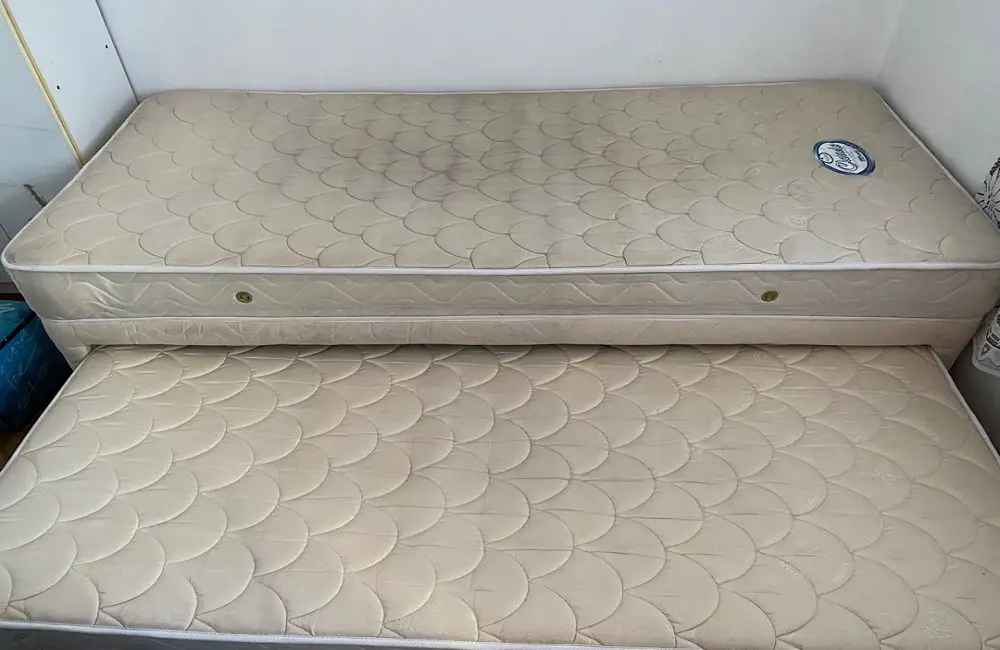When it comes to selecting the optimal mattress to enhance your sleep quality, there are several crucial considerations to keep in mind during the purchasing journey. Determining the right mattress involves more than just adhering to your budgetary constraints. It is essential to take into account various significant construction factors that can profoundly affect the comfort and performance of the bed tailored to your specific needs.
Moreover, given the multitude of available mattress options, being equipped with the knowledge of what to look for will aid in streamlining your decision-making process. Let me guide you through the steps of effectively choosing a new mattress, while highlighting the key aspects that warrant your attention throughout the entire buying process.
Related Article: How To Clean Your Mattress?
What To Look For In A Mattress?
When embarking on your mattress shopping journey, it is crucial to keep in mind that not all mattresses are created equal. Take the time to acquaint yourself with the various types available:
- Innerspring: These mattresses incorporate coils and provide a traditional, buoyant feel with added support.
- Memory Foam: Offering deep pressure relief, these mattresses “hug” the body to deliver a personalized level of comfort.
- Latex: Available in organic, synthetic, or blended options, latex mattresses offer ample bounce, natural cooling, breathability, and enhanced durability.
- Hybrid: Combining springs with layers of foam or other materials, hybrid mattresses offer the best of both worlds – optimal comfort, support, and increased airflow for a cool sleeping experience.
No matter which mattress type you choose, quality materials are paramount. They not only enhance comfort but also contribute to the longevity of the mattress. Look for features like a robust base crafted with higher-density foam for stability and specific layers designed to provide comfort and support.
Furthermore, consider cooling materials if you tend to overheat during sleep. Opt for mattresses with breathable covers and innovative elements such as charcoal-infused gel foam, which aids in heat dissipation and promotes healthier airflow.
By thoroughly considering these factors, you can make an informed decision when selecting a mattress that will cater to your specific needs and preferences.
How Does Your Body Affect Your Mattress Choice?
Selecting the right mattress firmness depends on several factors unique to each individual, including weight, height, age, and overall health. Consider the following guidelines as a general reference when determining the appropriate firmness level. Additionally, it’s important to remember that most high-quality mattresses offer a risk-free trial period, allowing you to personally experience and evaluate its suitability for you.
- If you weigh less than 150 lbs, softer to medium mattresses (rated between 4-6 in firmness) with a plush top tend to provide greater comfort for lighter body weights. These mattresses help alleviate pressure points and maintain proper spinal alignment. Should the mattress feel too firm, you can easily address this issue by adding a plush mattress topper. Lighter weight sleepers may find all-foam models particularly suitable.
- For those weighing between 150-200 lbs, medium-firm mattresses (rated at around 6-7 in firmness) offer a versatile and balanced option. Look for mattresses with a robust foundation layer and sufficient cushioning to support multiple sleeping positions. Individuals falling within this weight range have more flexibility in mattress selection, as long as it delivers a combination of comfort and support.
- Individuals weighing over 200lbs generally benefit from a firmer mattress (rated around 7-9 in firmness) to ensure optimal support and spinal alignment. Innerspring mattresses with a layer of foam cushioning can provide the necessary support without excessive sinking. This is particularly beneficial for heavier individuals.
Those with specific physical health issues like arthritis or fibromyalgia should prioritize a mattress that promotes proper spinal alignment to prevent tension and pain. Consulting a healthcare professional for guidance on selecting a mattress that accommodates your health needs is advisable. Orthopedic mattresses may be a suitable option for addressing these requirements effectively.
Remember, choosing the right mattress is a personal decision that involves considering various factors. Take advantage of trial periods and professional advice to find the optimal mattress that meets your specific needs.
How Does Your Sleep Style Affect Your Mattress Choice?
When selecting a mattress, the sleeping position is a crucial aspect to consider. Whether you sleep on your back, front, side, or a combination, each position has specific requirements. Take a look at this comprehensive guide, which highlights the mattress types that work best for each sleeping position:
- Back sleepers: Opt for a medium-firm mattress to ensure proper spinal alignment. The excellent support provided by hybrid mattresses, featuring a combination of coils and foam layers, is particularly suited for those who sleep on their backs.
- Side sleepers: You need a mattress that offers ample support for your shoulders and hips, while also providing pressure relief. Consider a medium-soft mattress that effectively contours your body, with memory foam options being particularly comfortable.
- Stomach sleepers: Sleeping on your front can potentially misalign your spine. Therefore, choose a firmer mattress like an innerspring or hybrid with a supportive base, ensuring that your hips remain level with your shoulders.
- Combination sleepers: If you frequently change your sleeping positions, a medium-firm mattress is recommended. Additionally, focus on mattresses with buoyant latex or hybrid constructions that facilitate easy movement. These options also minimize motion transfer, which is especially beneficial when sharing a bed.
By taking into account your specific sleeping position, you can choose a mattress that not only supports your body but also enhances your overall sleep quality.
How To Choose A Mattress For Back Pain
When it comes to choosing a mattress for back pain, a medium-firm option is generally recommended. This type of mattress provides adequate support for the natural curves of your spine while allowing your shoulders and hips to sink in slightly for added comfort.
In addition to support, it is important to look for good-quality materials such as springs and coils that offer proper support. However, it is crucial to pair these elements with a top layer that provides enough give to alleviate pressure points. Another consideration is selecting a mattress with cooling top comfort layers, especially if you tend to sleep hot. This can help prevent exacerbating your back pain as you toss and turn to find a comfortable position.
Firmness is a key factor to consider as well. It is not recommended to sleep on a mattress that is too soft as it can cause various points of your body to sink too far and result in misalignment of your spine.
On the other hand, a mattress that is too firm may not provide the necessary cradling effect. Ideally, you should find a mattress that offers a comfortable balance between support and give, ensuring you are properly supported while still experiencing some degree of cradling.
How To Choose A Mattress For Kids And Babies
As children grow, their need for sleep increases compared to adults. Sufficient sleep is crucial for the healthy development of their bones, muscles, and joints. Therefore, providing a comfortable bed is essential. However, when choosing a mattress for babies and children, there are important safety considerations to keep in mind.
Contrary to what may seem intuitive, newborns and toddlers require a firm mattress. A mattress that is too soft can be extremely dangerous if the infant sinks in too much. Hence, using a firm mattress during the first few years of a child’s life is highly recommended.
Additionally, mattresses for kids must meet strict safety regulations, such as CPSC standards in the US or British Safety Standards in the UK, so it is essential to check for compliance before making a purchase.
In addition to safety, it is important to ensure that a child or baby’s mattress fits securely in their cot or bed. Adequate ventilation is also necessary to keep the infant cool, dry, and comfortable. Many toddler and baby mattresses come with wipe-clean or removable covers that can be washed at high temperatures, minimizing the accumulation of bacteria.
Similar to adult beds, investing in the highest quality crib mattress within your budget is ideal to ensure both quality and safety. Notably, Purple and Saatva offer plush children’s mattresses that provide the utmost comfort for little ones to sleep on.
In conclusion, prioritize the well-being of your child by selecting a suitable mattress that meets safety standards, offers firm support, and promotes comfort and hygiene.
How To Choose A Mattress For A Guest Room
- Budget: Before you start shopping for a new mattress, determine how much you want to spend. A quality mattress can last for ten years or more, so consider it an investment in your guest’s comfort. A more expensive mattress may have advanced features such as cooling technologies, higher quality materials, and advanced support systems. However, there are some budget options with high-quality materials and good longevity.
- Size: When it comes to size, it’s best to stick with the industry standard. A queen-sized bed is the perfect size for most guest rooms. It provides ample space for single sleepers and couples alike. If you have a larger guest room, consider a king-size mattress.
- Comfort: Everyone has their own preferences when it comes to mattress comfort. If your guests are unsure which type of mattress they prefer, choose a medium-firm mattress. This suits most people’s comfort needs. However, if you know your guests have specific requirements, such as firmness or plushness, try to accommodate them with a customized mattress.
- Durability: A high-quality mattress is important, but so is durability. You’ll want a mattress that can last for years without sagging or losing its shape. Look for mattresses that come with a warranty. It’ll give you peace of mind if something goes wrong with the mattress.
- Type: Memory foam, innerspring, hybrid, or latex? Not sure which type of mattress is best for your guest room? Consider memory foam if your guests prefer a soft and body-hugging feel. Innerspring is ideal if you’re looking for a traditional mattress that offers excellent support. A hybrid mattress combines memory foam with innerspring coils, offering the best of both worlds. Latex mattresses offer excellent support and are ideal for those who are allergic to dust mites.
Final Words
Choosing the right mattress is an investment in your health, comfort, and overall well-being. There’s no one perfect mattress for everyone; it depends on your unique sleeping needs, preferences, and budget. By following these tips, you’ll have a better idea of what to look for when you’re shopping for a mattress. Don’t rush the process; take your time to ensure you make the right choice. Happy sleeping!


